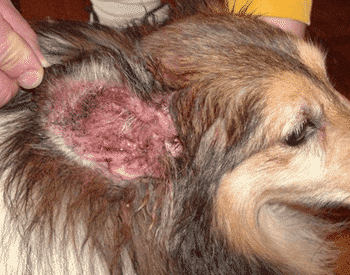This is because the skin barrier in allergy-prone animals is not as tight as in other animals. This results in allergens getting into the skin and irritating the local immune system inside the skin. This irritation results in itchiness, rashes, and infections. You may notice your pet chewing or licking excessively at their paws or scratching their ears. On white-furred animals you are even notice the staining of the saliva on their fur. It turns the fur into a brown colour in the area they are licking.


How can I manage my pet's seasonal allergies at home?
There are a number of prescription medication options and "allergy shots" available for pets to deal with seasonal allergies. Sometimes pets have no visible infections or rashes, they are just itchy. These pets often benefit from anti-itchy medication or allergy shots during the allergy season. If seasonal allergies have resulted in an ear infection, pets require ear cleaning and medicated ear drops. If your pet's allergies have resulted in rashes or skin infections, often animals require oral or topical antibiotics and anti-itchy medication to relieve them of the discomfort.
Bathing your pet with a skin-calming or hypoallergenic shampoo after coming in from the outside can help too. When pollens stick to their fur, some pets become very itchy! It can be helpful to put a t-shirt or shoes/boots on them while they are outside to help protect their skin from pollen. If your pet will not wear any clothing, you can also wipe their tummy and paws with a cleansing wipe when they come inside.
However, there are other causes of excessive licking and infections. These include fleas and flea allergy dermatitis, bacterial infections, food allergies, and auto-immune disease. Please contact us if your pet is itchy and we can discuss the potential causes and management options with you. Whether they have a rash, ear infection, or are just plain itchy there are a variety of management options to help control seasonal allergies!